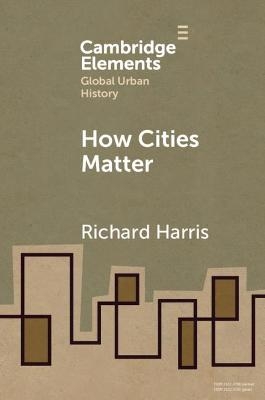
How Cities Matter
Seiten
2021
Cambridge University Press (Verlag)
978-1-108-74926-8 (ISBN)
Cambridge University Press (Verlag)
978-1-108-74926-8 (ISBN)
Why should we care how cities matter? What difference does it make to how we understand our daily lives or, for those of us who are academics, to what we research and how we teach? This Element examines these questions.
Most historians and social scientists treat cities as mere settings. In fact, urban places shape our experience. There, daily life has a faster, artificial rhythm and, for good and ill, people and agencies affect each other through externalities (uncompensated effects) whose impact is inherently geographical. In economic terms, urban concentration enables efficiency and promotes innovation while raising the costs of land, housing, and labour. Socially, it can alienate or provide anonymity, while fostering new forms of community. It creates congestion and pollution, posing challenges for governance. Some effects extend beyond urban borders, creating cultural change. The character of cities varies by country and world region, but it has generic qualities, a claim best tested by comparing places that are most different. These qualities intertwine, creating built environments that endure. To fully comprehend such path dependency, we need to develop a synthetic vision that is historically and geographically informed.
Most historians and social scientists treat cities as mere settings. In fact, urban places shape our experience. There, daily life has a faster, artificial rhythm and, for good and ill, people and agencies affect each other through externalities (uncompensated effects) whose impact is inherently geographical. In economic terms, urban concentration enables efficiency and promotes innovation while raising the costs of land, housing, and labour. Socially, it can alienate or provide anonymity, while fostering new forms of community. It creates congestion and pollution, posing challenges for governance. Some effects extend beyond urban borders, creating cultural change. The character of cities varies by country and world region, but it has generic qualities, a claim best tested by comparing places that are most different. These qualities intertwine, creating built environments that endure. To fully comprehend such path dependency, we need to develop a synthetic vision that is historically and geographically informed.
1. Introduction; 2. Historians and the Urban Question; 3. The Economic Significance of Cities; 4. Urbanism As Ways of Life; 5. 'Urban' Problems and Governance; 6. Beyond City Limits: Connections and Comparisons; 7. Conclusion.
| Erscheinungsdatum | 02.08.2021 |
|---|---|
| Reihe/Serie | Elements in Global Urban History |
| Zusatzinfo | Worked examples or Exercises |
| Verlagsort | Cambridge |
| Sprache | englisch |
| Maße | 151 x 228 mm |
| Gewicht | 151 g |
| Themenwelt | Geisteswissenschaften ► Geschichte ► Allgemeine Geschichte |
| Naturwissenschaften ► Geowissenschaften ► Geografie / Kartografie | |
| Sozialwissenschaften ► Soziologie | |
| ISBN-10 | 1-108-74926-7 / 1108749267 |
| ISBN-13 | 978-1-108-74926-8 / 9781108749268 |
| Zustand | Neuware |
| Haben Sie eine Frage zum Produkt? |
Mehr entdecken
aus dem Bereich
aus dem Bereich
eine Familiengeschichte der Menschheit
Buch | Hardcover (2023)
Klett-Cotta (Verlag)
CHF 68,60
Eine wahre Geschichte von Schiffbruch, Mord und Meuterei
Buch | Hardcover (2024)
C.Bertelsmann (Verlag)
CHF 34,95


